Last Updated: 1 year ago
If you’ve ever noticed your cat trembling, you probably wondered, Why is my cat shaking?
It may be nothing more than a bit of nervousness. It could also be caused by something serious.
As you’ll learn, cat shaking can have many causes, so it’s not a sign you should ignore.
Fortunately, I’m here to talk about why your cat is shaking and what you can do to stop the shaking.
Just keep reading.
What Causes a Cat to Shake?
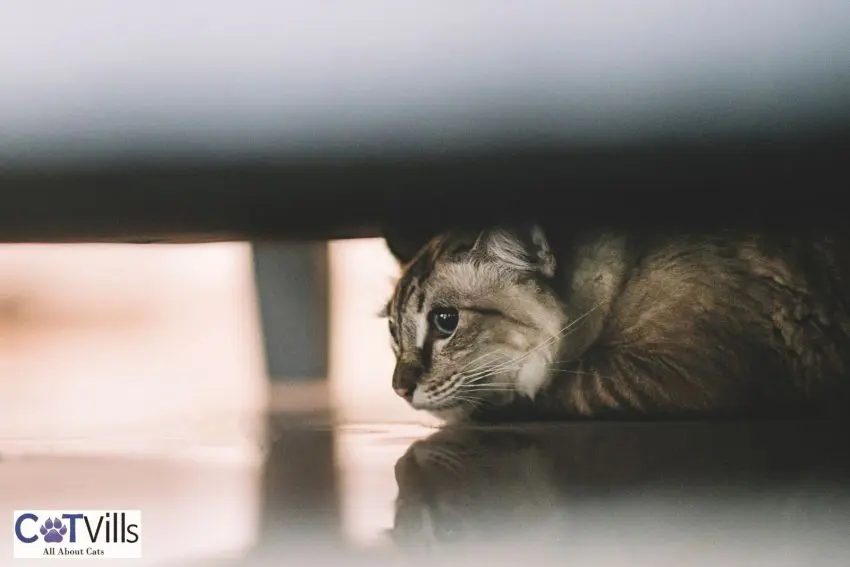
It’s normal to feel worried when you come home and find your cat trembling in the corner or shaking under the bed. After all, sudden behavior changes can point to a serious medical condition.
But you shouldn’t panic and assume the worst because not all shaking causes are life-threatening, and you can resolve them quickly at home.
So, why is my cat shaking so much? Usually, cats tremble when scared, cold, or ill. So, the cause can be an underlying medical condition or psychological issue.
Since it’s not easy to tell whether the problem is medical or physiological, let’s discuss these possible causes.
#1 Fear and Phobia
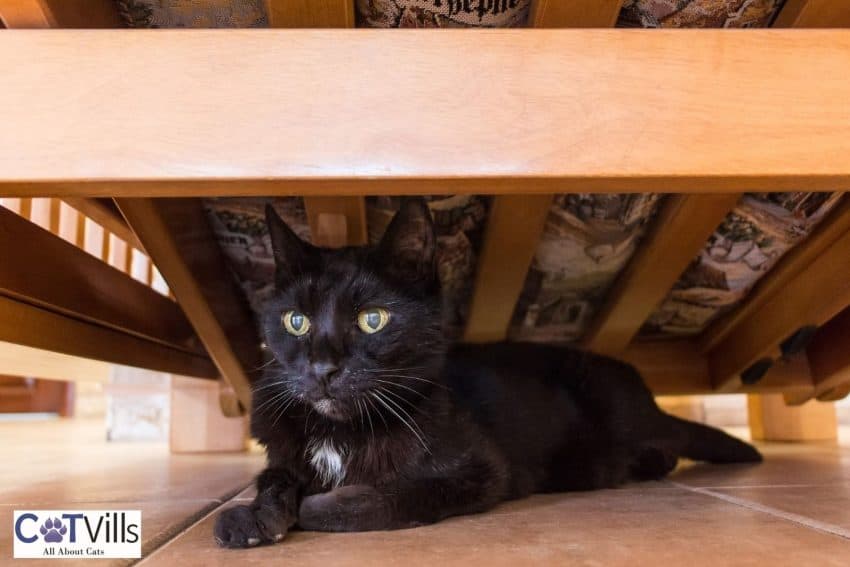
It’s easy to scare a cat to the point where your kitty completely freezes or hides under the bed in panic. But do cats shake when scared?
Like people, some cats shake when they’re afraid, especially if you corner them and cut out their escape route. In this case, you’re likely to notice your cat’s entire body trembling.
Some cats also develop phobias after an intensely traumatic experience. When these cats encounter a trigger, they start trembling and shaking.
Other signs of fear include aggression, dilated pupils, pulled-back ears, and hissing, just like.
#2 Anxiety
As a veterinarian from PetMd explain, “An anxious cat may have physical reactions such as increased heart and respiratory rates, panting, trembling, and salivation.”
Lack of socialization, previous trauma, separation anxiety, and changes in the routine are among the top cause of stress in cats.
Since it’s not healthy for your feline friend to be always on edge, you should speak to your veterinarian and work on a treatment plan to reduce your cat’s stress levels.
#3 Low Blood Sugar
Hypoglycemia occurs when your cat’s blood sugar levels drop, for example, after an extended period of fasting. It can be life-threatening for kittens and adult cats, leading to seizures and coma.
The usual signs are trembling, disorientation, rapid breathing, lethargy, increased appetite, and coordination problems.
Low glucose levels can also point to an underlying medical condition, such as diabetes or other problems with the secretion of insulin.
For adult cats with diabetes, shaking can point to an insulin injection overdose. It would help if you took your cat to the vet to stabilize its blood glucose level.
#4 Hypothermia
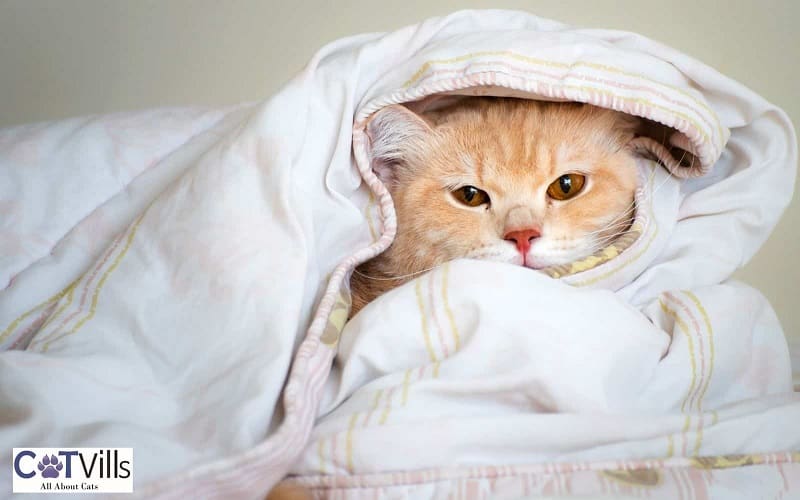
While cats have a thick coat to keep them warm, it’s possible for cats to shake because they’re too cold and in danger of hypothermia.
As specialists explain, “Initially, your cat will shiver violently as his body attempts to generate warmth.” Then cats get lethargic, and their breathing and heart rate slow down.
If you don’t take measures to raise your cat’s body temperature, your kitty’s condition will turn critical quickly.
Besides exposure to the elements, anesthesia can also cause hypothermia in cats. You should keep your kitty in a warm location after surgery.
#5 Fever
What does it mean when your cat is shaking? When we hear such a question, our first thought is fever, especially in kittens.
Cats run hotter than humans, so the normal body temperature of healthy adult cats is between 100.4º to 102.5º Fahrenheit. Anything over 102.5 degrees is considered a fever.
The usual signs of elevated body temperature in cats are lack of appetite, lethargy, lack of grooming, shaking, trembling, and rapid heart rate.
The fever can be due to an infection, poisoning, medication, or trauma. It’s best to take your kitty for blood tests to rule out some serious feline infectious diseases.
#6 Pain
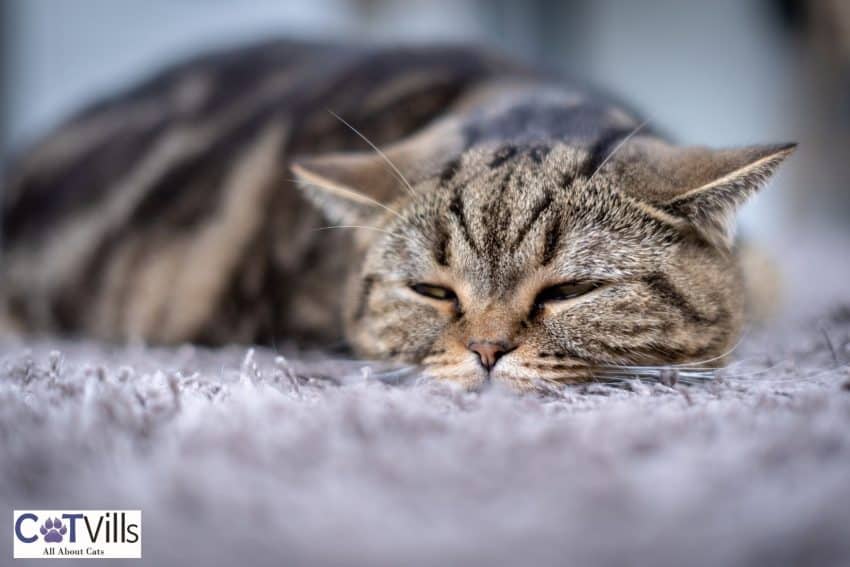
Cats are not used to showing vulnerability, but when your feline is in a great deal of pain, you may notice them trembling, hissing, and growing when you attempt to touch them.
I’ve also seen cats in labor shake and tremble, especially first-time mothers freaking out because they don’t know what’s happening.
Even if you can’t see any injuries or trauma, you should speak with a veterinarian as soon as possible.
#7 Shock
One of the usual signs of shock in cats is trembling. Shock can occur due to blood loss, severe injury, poisoning, and infections.
Check your cat’s gums, and if they’re pale instead of pink, you should take them to the vet as soon as possible. Cold limbs and increased heart rate can also point to shock.
#8 Kidney disease
Kidneys have the vital task of filtering toxins and waste from the bloodstream, so when kidney failure occurs, the whole body suffers.
In the end stages of the disease, it’s likely to observe seizures and trembling in affected cats.
#9 Dreaming
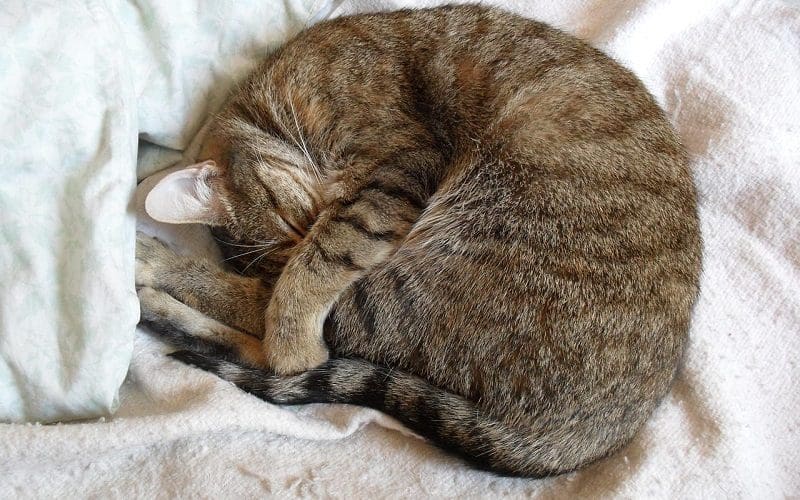
Why is my cat shaking while resting? Usually, a cat twitching in sleep indicates that your kitty dreams about something.
As Michel Jouvet discovered in the 1960s, cats experience characteristics of REM sleep, such as twitching eyes, relaxed muscles, and brain activity.
While we don’t know what’s going on through a cat’s head, they’re likely dreaming when you see your cat kicking and twitching in sleep.
#10 Poison
Unfortunately, cats can come into contact with chemicals, human medications, toxic plants, and toxic substances.
Ingesting something poisonous can make your cat tremble, vomit, wobble, or lose appetite. If you suspect your cat is poisoned, you should seek veterinary attention immediately.
#11 Seizures
Seizures in cats are a sudden surge of uncontrollable muscle twitchings, ranging in duration from a few seconds to a few minutes. They’re due to a temporal disturbance in the normal brain function.
Seizures can result from poisoning, brain trauma, or brain disease. Repeated episodes of seizures are called epilepsy.
If you aren’t sure whether your cat is trembling or having a seizure, you should take a video and show it to your vet.
#12 Tremors
Why does my cat shake?
Sometimes pet parents think their cat is shaking, but they’re seeing involuntary muscle trembling, also known as tremors.
Such repetitive muscle movements involve rapid or slow twitchings in the whole body or parts. They can be due to poisoning, hypoglycemia, kidney failure, nervous system disease, or inflammation.
Sometimes, tremors in cats are also the side effects of certain medications or something your cat inherited from its parents.
#13 Cat Ear Infections/ Mites
Is your cat twitching its head and scratching like crazy? Then your kitty might have ear mites.
Fortunately, these parasites are easy to get rid of with the right spot on flea treatment.
But head shaking can also indicate an outer ear infection, so you shouldn’t ignore it.
What To Do If My Cat Is Shaking?
So, your cat is shaking and trembling. The most important thing is not to panic and do anything rash to scare your kitty into hiding. Instead, follow these six tips.
#1 Seek Medical Attention

If your cat starts shaking out of the blue, you should call your vet and explain what’s going on. Your veterinarian will tell you if you should bring the cat in for examination and blood test.
While shaking can be due to minor issues, it’s better to err on the side of caution, especially if your cat has chronic diseases.
Some infections can be deadly for kittens and senior cats, so the sooner you start treatment, the better.
#2 Check Your Cat’s Blood Sugar Levels
As I already said, shaking can be due to low blood sugar levels, especially if your cat is sick and not eating or has a metabolic disease.
So, if you have a glucometer, you should check your kitty’s blood glucose levels. The typical readings are between 80-120 mg/dL.
#3 Warm Up Your Cat
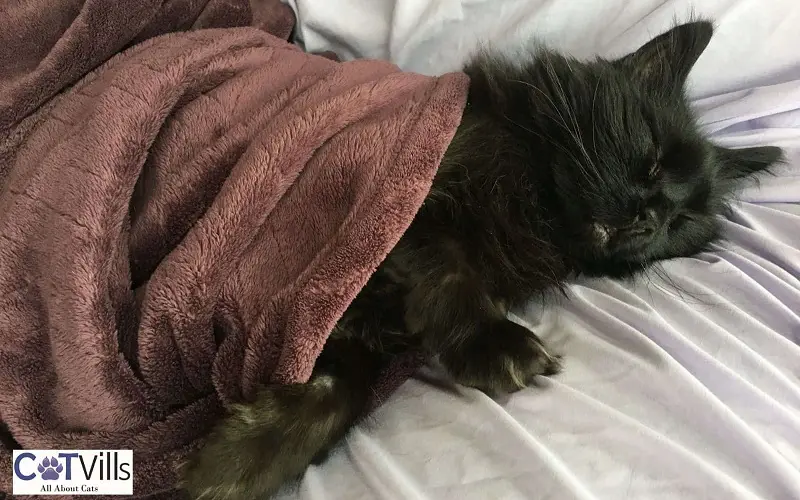
It’s vital to warm up cats who are cold as soon as possible, especially kittens. Otherwise, your cat’s organs will shut down.
Just wrap your cat in a warm blanket and bring it into a heated area. Don’t use a heating pad because you can burn your kitty’s fur.
You should get your cat to the vet for proper treatment for severe hypothermia.
#4 Give Your Cat Space
If your kitty is shaking due to fear and anxiety, you must give your cat space. Don’t try to approach or handle them until your cat has calmed down.
Try to figure out what’s causing your cat’s anxiety so that you can work out a successful treatment plan with your vet.
#5 Check for Toxins
Many things around the house can be dangerous for cats.
Check to make sure your cat hasn’t nibbed on any harmful plants or eaten human food toxic to felines.
#6 Talk Gently
Whether your cat is ill or scared, being near and talking to them gently can help your kitty recover quickly.
How to Prevent Cat Shaking
Is it possible to prevent cat shaking?
While you can’t always predict every likely scenario, I’ve got a few simple tips that can help you prevent the most common reasons for shaking.
#1 Provide Nutritious Diet
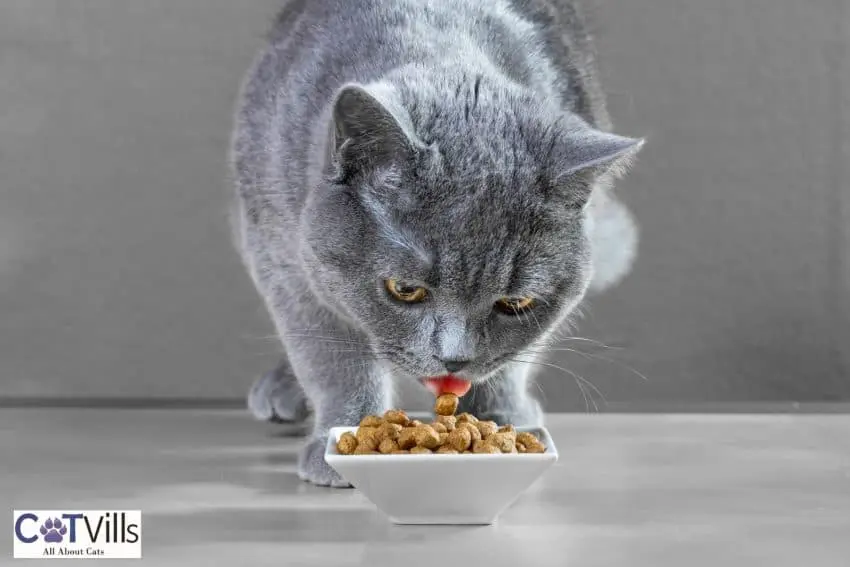
Cats need a balanced diet to ensure enough nutrients to thrive. Cheap cat food brands are full of carbohydrates, which are bad for your cat and can raise their blood glucose levels.
And cheap cat food may not be enough to sate your cat’s hunger, leading to episodes of shaking and trembling. So, providing high-quality food can make all the difference.
#2 Regular Vet Check-Ups
Your adult cat should see the vet at least twice a year to ensure there’s nothing wrong with them.
And don’t forget that you have to deworm your pet regularly.
#3 Don’t Let Your Cat Outside
The outside world holds many dangers for cats – predators, cars, bad people, cold weather, etc.
It’s better to keep your cat indoors by cat-proofing the windows and balconies to prevent escape attempts.
#4 Socialize Your Cat
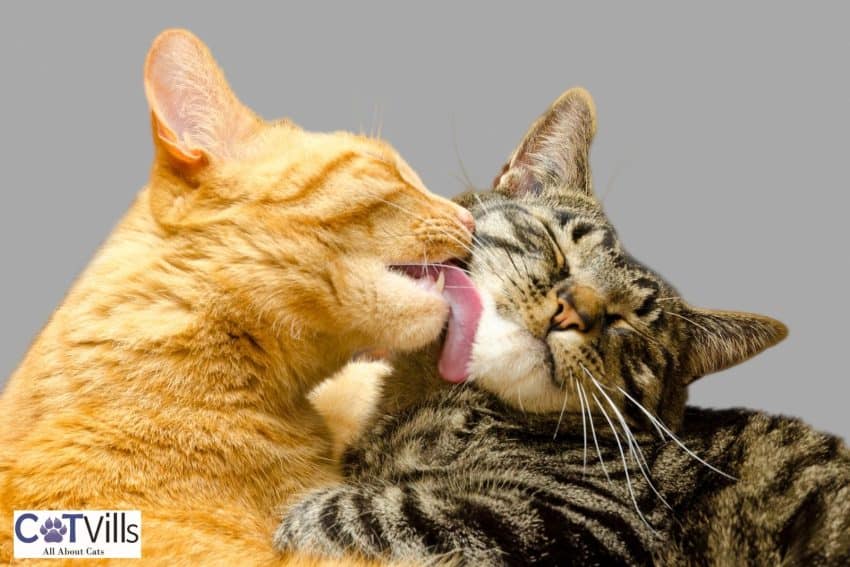
Lack of socialization can make a cat afraid of other people, animals, and familiar sounds.
So, to prevent cat shaking due to fear and phobias, you should ensure your cat is well-socialized.
#5 Don’t Forget the Weather
While cats tolerate the cold better than humans, extreme temperatures are dangerous for your cat and lead to hypothermia.
So, keep your cat indoors when it’s freezing and dry your cat well when you bathe them.
#6 Regular Medication
If your cat has seizures or diabetes, don’t forget to follow your vet’s prescription and administer insulin/anti-seizure medication on time.
Conclusion
Why is my cat shaking? To determine the cause, you should consider your cat’s body language, environment, and age.
Cats who hide or have poor appetite are likely sick, and kittens who tremble can take a turn for the worst in a couple of hours.
So, while not all reasons why cats shake are severe, you shouldn’t ignore frequent episodes of trembling and seek medical advice.
What do you think about these reasons why cats shake? Has your cat ever trembled? Share your experience in the comment section.
Resources:

